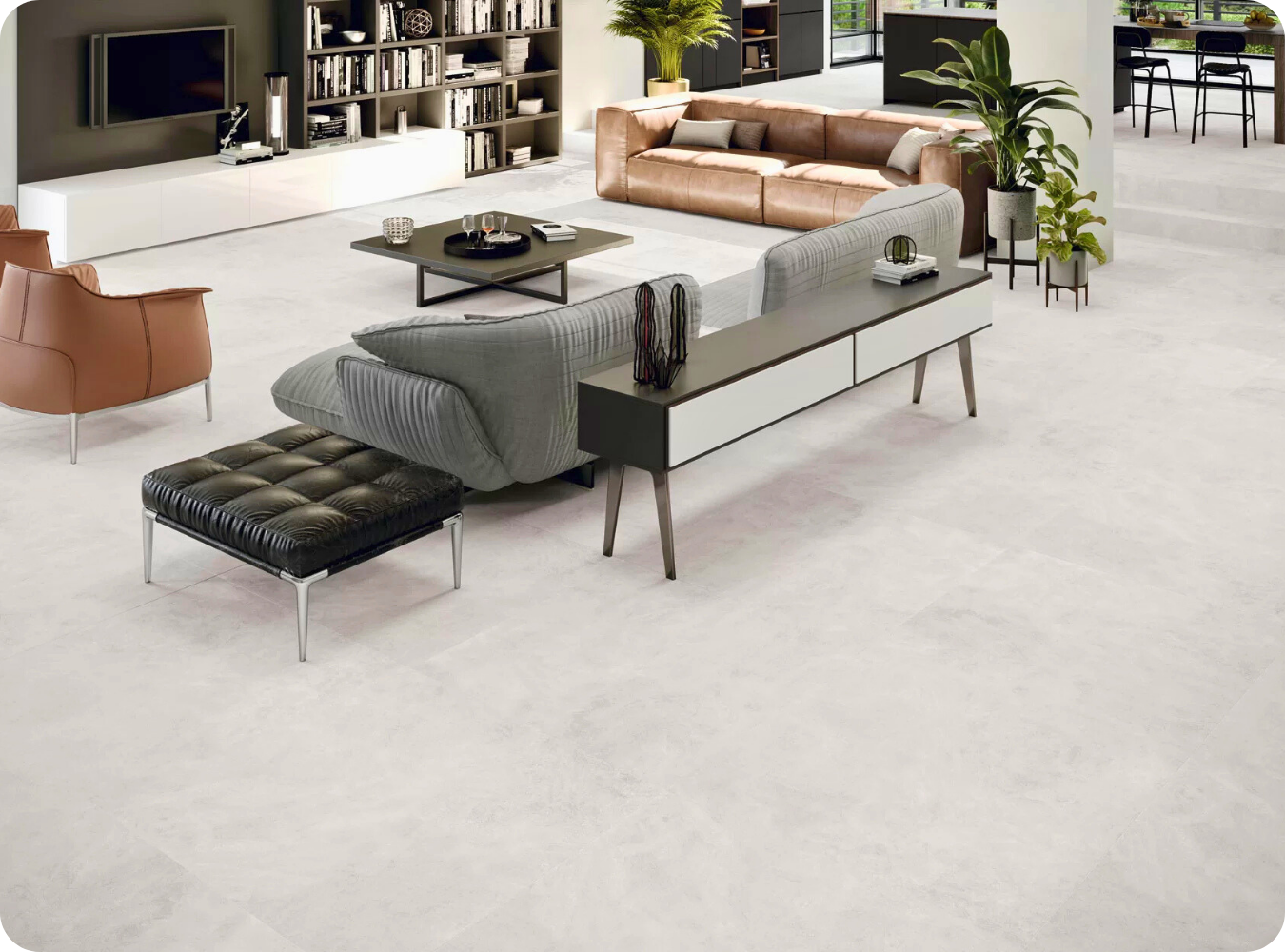Choose the best flooring for a house It is one of the most important decisions when building or renovating. It not only affects the aesthetics of the home, but also comfort, long-term durability and daily maintenance. Among all the available options —wood, vinyl, ceramic or laminates— porcelain stoneware has established itself as the best alternative for those seeking a perfect balance between beauty and functionality.
In this article, we explain how to choose the best flooring for a home, the advantages of porcelain tiles, and compare them with other common types of flooring.
How to choose the best flooring for a house
Every home has different needs depending on the lifestyle of its inhabitants, its location, the climate, and how the rooms are used. Below, we review the main factors you should take into account.
Key factors: durability, aesthetics, maintenance, price
- Durability: The floor must be resistant to knocks, scratches, moisture and constant traffic without deteriorating easily.
- Aesthetics: The chosen finish should match the decorative style of the house and maintain its appearance over time.
- Maintenance Some materials require special treatment, while others can be cleaned quickly and easily.
- Price: The budget influences the choice, but it is important to assess the relationship between initial investment and useful life.
Areas of the house and recommended flooring
- Living room and bedrooms: Warm, comfortable floors with good sound insulation.
- Kitchen: materials resistant to wear, moisture and stains.
- Toilets: non-slip, waterproof and easy-to-clean surfaces.
- Outdoor areas (terraces, patios, porches): Flooring that is resistant to sunlight and temperature changes, with non-slip finishes.
The challenge lies in finding a material that works well in all these rooms. And that's where porcelain stoneware comes in.
Porcelain stoneware: the most complete flooring for your home
The porcelain stoneware is a type of ceramic tile made from high-purity clays, pressed at high pressure and fired at very high temperatures. The result is a compact, low-porosity material with superior resistance to impact, moisture and temperature changes.
Main advantages of porcelain stoneware
The porcelain stoneware is a type of ceramic tile made from high-purity clays, pressed at high pressure and fired at very high temperatures. The result is a compact, low-porosity material with superior resistance to impact, moisture and temperature changes.
High resistance to wear and moisture
Unlike wood or laminate, porcelain stoneware does not warp with moisture or lose its properties over time. It is ideal for high-traffic areas (kitchens, hallways, living rooms) as well as bathrooms and outdoor areas.
Wide aesthetic variety
Thanks to digital printing, porcelain tiles can now reproduce almost any finish: wood, natural stone, cement, marble, or even metal. This allows the flooring to be adapted to any decorative style, from minimalist environments to more classic designs.
Easy Maintenance
Porcelain tiles do not require any special products or treatments. All you need is water and a neutral detergent to keep them looking spotless. They are also highly resistant to stains and scratches, making them a practical choice for homes with children or pets.
Suitable for indoor and outdoor use
Thanks to its different finishes—polished, matte, non-slip—porcelain stoneware adapts to any space in the home. It can be installed in living rooms, bathrooms, kitchens, terraces, or even swimming pools, maintaining a uniform style throughout the home.
Quick comparison with other soil types
Although porcelain stoneware is the most comprehensive option, it is useful to know the characteristics of other common flooring types in order to better evaluate your choice.
| Soil type | Features |
|---|---|
| Wooden floor Warm, but less durable |
Natural wood adds warmth and elegance, but it is very sensitive to moisture, knocks and scratches. It requires regular maintenance (sanding, varnishing) and is not the most practical option for high-traffic areas. |
| Laminate flooring Economical, but less durable |
Laminate imitates wood at a low cost, but its resistance is limited. Although it can be an aesthetic solution, it does not withstand water well and has a shorter lifespan than porcelain. |
| Vinyl flooring Good choice for bathrooms, but less aesthetically pleasing |
Vinyl is inexpensive, waterproof, and easy to install. However, it lacks the sophistication and durability of porcelain tile. It can be useful in bathrooms or secondary kitchens, but it is rarely used as the primary flooring throughout the entire home. |
| Ceramic flooring Resistant, but less versatile than porcelain tiles |
Traditional ceramic tiles offer strength and affordability, but they do not match the density, durability or aesthetic appeal of porcelain tiles. They also tend to be more limited in terms of formats and finishes. |
If you are looking for flooring that combines strength, aesthetics, versatility and easy maintenance, porcelain stoneware is the answer. Unlike other materials, it adapts to all rooms in the home, both indoors and outdoors, offering long-term durability and multiple design possibilities.
In short, porcelain stoneware is not only the best flooring for a home, it is also a smart investment that guarantees comfort, style and durability for many years to come.
Your home deserves the best flooring: choose porcelain tiles
Are you renovating your home or choosing materials for a new build? Discover why porcelain stoneware is the most resistant, elegant and versatile option for every corner of your home.
Do not choose blindly. Opt for quality and durability.
